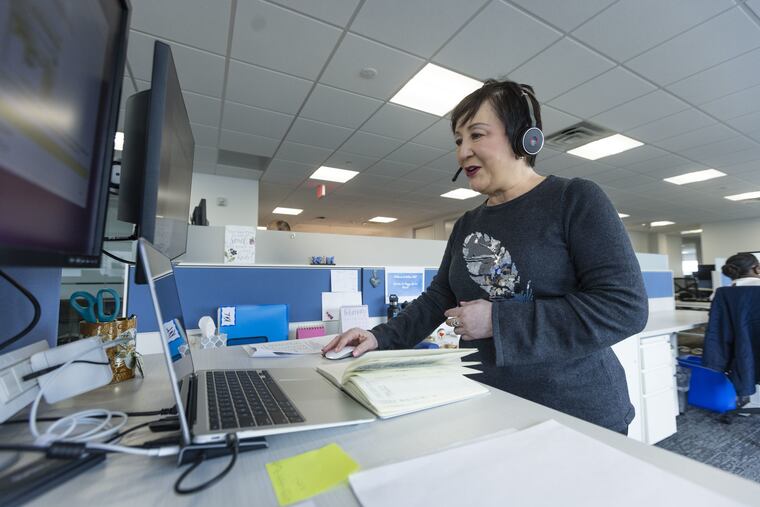A new approach to primary care for seniors is taking shape in Philadelphia at Patina Health
The Bala Cynwyd start-up has been providing its services to IBC Medicare Advantage members this year and is expanding to be available to Aetna, Cigna, and UnitedHealthcare in 2023.

Chestnut Hill resident Mark Pinsky was tired of feeling like a number at the doctor’s practice he’d used since the 1990s, so when he turned 65 last summer and signed up for Medicare, he decided to make a change.
He switched to Patina Health, a primary start-up for people 65 and older that launched this year and so far has only been available to customers of Independence Blue Cross’s Medicare Advantage plans in Southeastern Pennsylvania.
So far, Pinsky said last week, he’s been thrilled with the responsiveness and thoughtfulness of Patina’s hybrid of in-person at home and virtual care.
“I am recommending this to all my peers who are looking at Medicare,” said Pinsky, who works in community development finance.
Patina, based in Bala Cynwyd, declined to say how many IBC Medicare Advantage members have chosen Patina for primary care. The company, which has about 100 employees, also declined to disclose its revenue.
Starting Jan. 1, Patina will also be an in-network provider for Medicare Advantage plans offered by Aetna, Cigna, and UnitedHealthcare. That will bring the total patient pool available to Patina to more than 250,000, the company said.
A new breed of primary care
Backed by $57 million from Andreessen Horowitz, Google Ventures, and other venture capital firms, Patina, founded in 2020, is among a large and growing number of companies trying to break through the traditional way of providing health care in this country, which involves being paid more for providing more services.
That traditional model, called fee-for-service, is particularly damaging to primary care, said Jack Stoddard, Patina’s CEO and a veteran of several health-care start-ups, including Plymouth Meeting’s Accolade, which helps employees of big companies navigate health-care services and is now publicly traded.
“You don’t get paid to do all the things that actually should happen: be proactive, check in with patients, coordinate care, work with specialists, make sure that discharge is coordinated and planned. All of that is what makes the experience better. It also makes clinical quality better, and it makes the system less expensive,” Stoddard said.
Other companies are also taking a broader approach to caring for seniors, including Oak Street Health and ChenMed, both with locations in Philadelphia, but those companies still have clinics. Patina instead sends caregivers, usually a registered nurse or a nurse practitioner, to patients’ homes, where they virtually dial in a doctor over a tablet when necessary.
“That’s where you can really get a better understanding of who they are,” Stoddard said of the home visits. When Patina sends a nurse to a patient’s home, the nurse gets a sense of the neighborhood and the amount of social support, whether the patient has enough to eat, how the patient manages medicines, and whether the patient has air-conditioning, he said.
Stoddard said Patina has been appealing to more tech-savvy and healthier seniors because they are used to on-demand services like Amazon Prime, Netflix, and DoorDash. It also appeals to seniors who have a hard time getting to their primary care doctor, he said.
Positive review from IBC
An IBC executive, Kortney Cruz, praised Patina for trying “a new approach and model to care for a population we care tremendously about.”
“I’m a big believer that particularly for the aging senior population, once you get past, say, 72, 75 ... a virtual-only type of [primary care] model just isn’t going to cut it,” said Cruz, senior vice president for government markets. “We were really interested in what Patina could bring to the table because they were bringing that ease, being that the care comes to you.”
IBC is pleased with what it has seen so far from Patina, but it is far too early to evaluate the company’s clinical results, Cruz said.
A skeptic won over
Pinsky was skeptical when he first heard about Patina. “Oh yes, this is another one of those companies that uses technology, but they don’t really care about you,” he thought.
He had that experience at his former doctor’s office, where he “felt like a number, or a whole set of numbers,” and where, he said, “it was impossible to get anything close to what I would call personal care.”
Pinsky reports that things are good so far with Patina. “They promised to come to you, which they do. They are available anytime,” he said. “If I write them in the middle of the day, I get a response in five or 10 minutes.”
Pinsky said his primary care provider is a “very skilled nurse practitioner,” who can bring in a doctor if needed.
He likes having a “health champion, whose job is not to be a care provider, but whose job it is to know me, know my situation, know what I need, know whatever quirks I have as a patient,” he said. “They know what I complain about, what they should take seriously and what not.”